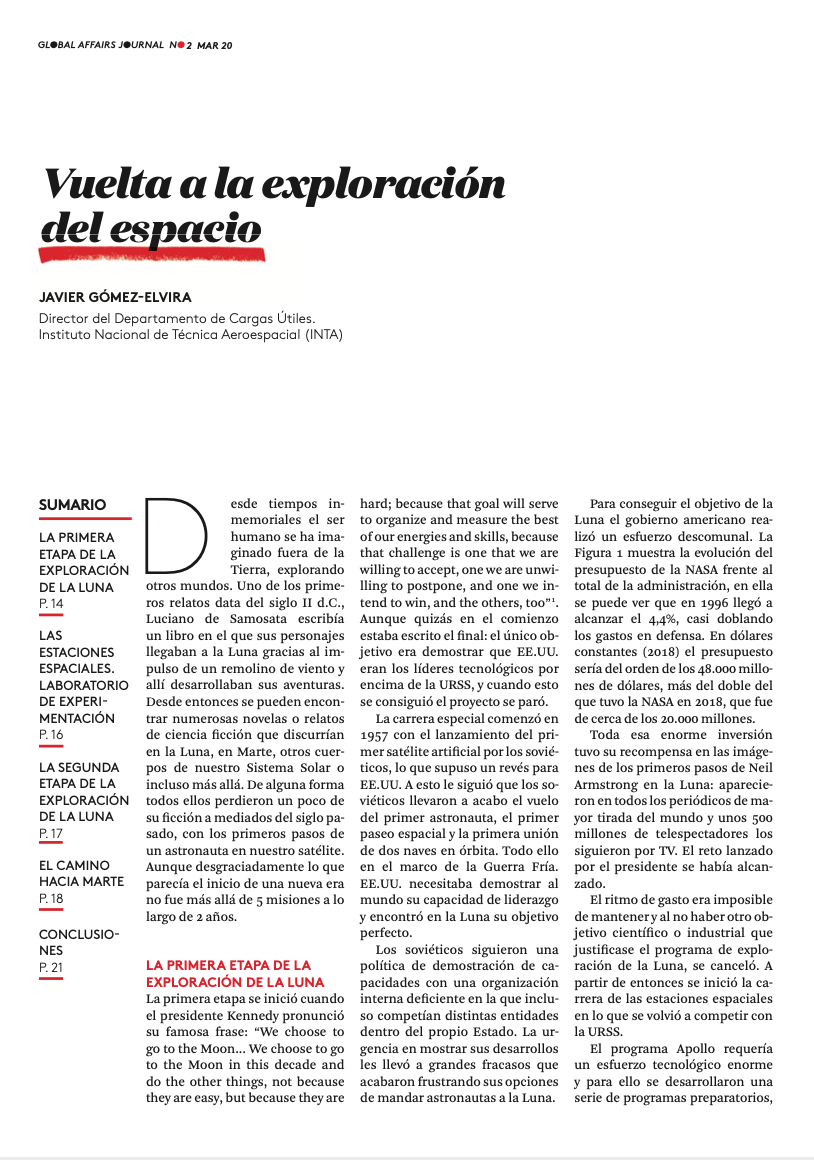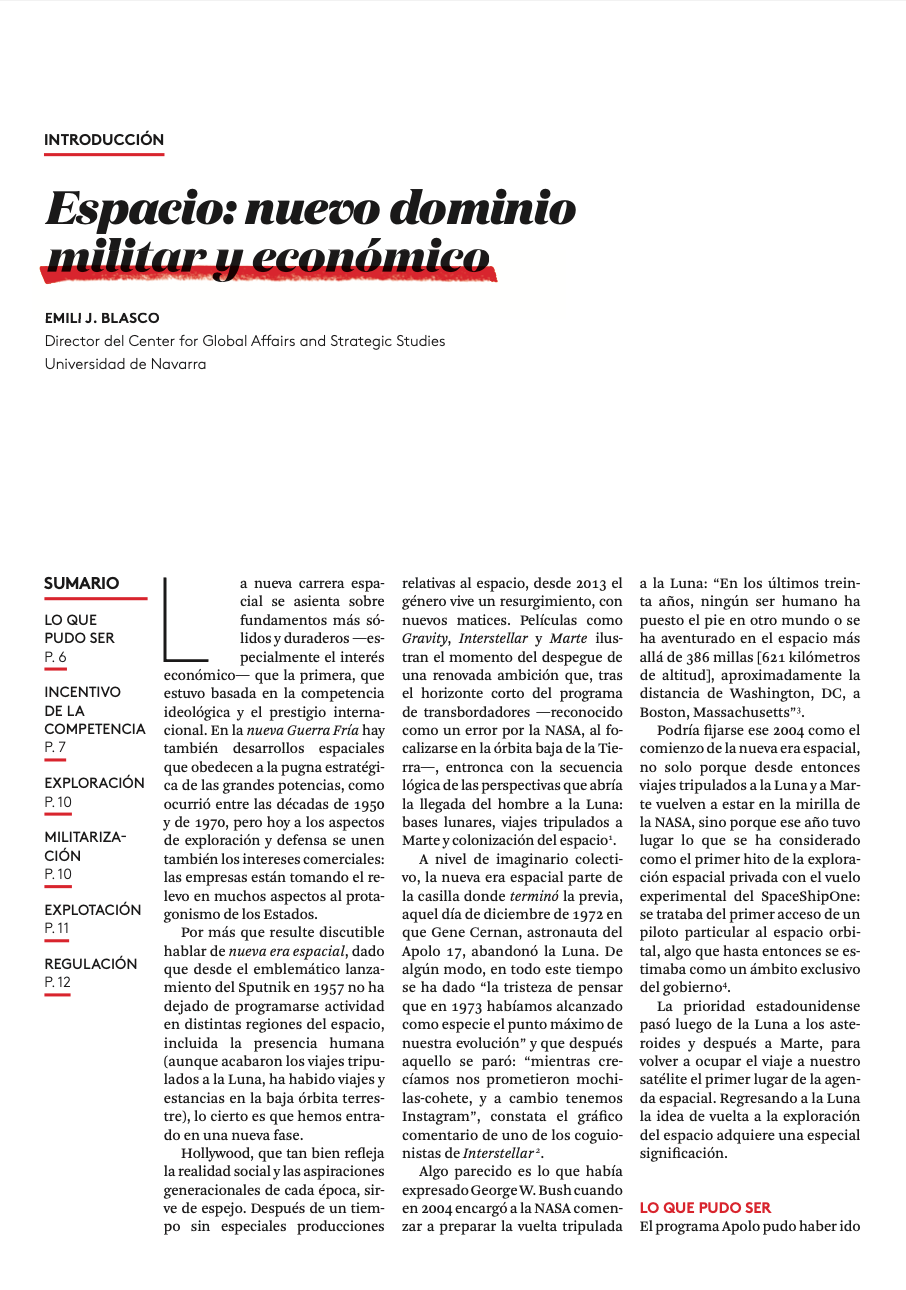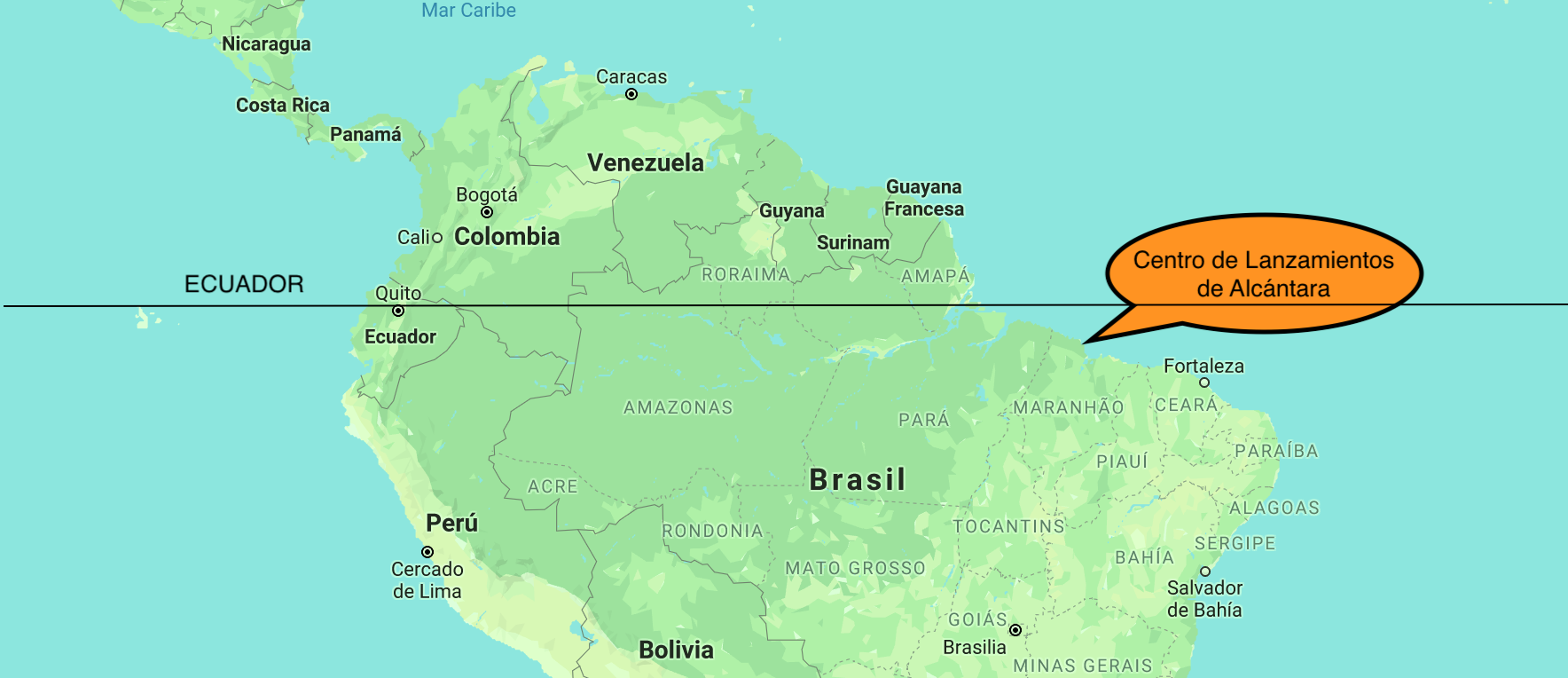Ruta de navegación
Blogs
Entries with label new space age .
![In addition to the return to the Moon and Mars, asteroid travel programmes are also being accelerated [NASA]. In addition to the return to the Moon and Mars, asteroid travel programmes are also being accelerated [NASA].](/documents/10174/16849987/gaj-foto-1.jpg)
In addition to the return to the Moon and the arrival on Mars, asteroid travel programmes are also being accelerated [NASA].
GLOBAL AFFAIRS JOURNAL / Javier Gómez-Elvira
 [8-page document. downloadin PDF]
[8-page document. downloadin PDF]
INTRODUCTION
Since time immemorial, human beings have imagined themselves outside the Earth, exploring other worlds. One of the first stories dates back to the 2nd century A.D. Lucian of Samosata wrote a book in which his characters reached the moon thanks to the impulse of a whirlwind and there they developed their adventures. Since then, one can find numerous science fiction novels or stories set on the Moon, on Mars, on other bodies in our Solar System or even beyond. Somehow they all lost a bit of their fiction in the middle of the last century, with the first steps of an astronaut on our satellite. Unfortunately, however, what seemed to be the beginning of a new era did not go beyond 5 missions over 2 years.
The first stage began when President Kennedy uttered his famous phrase: "We choose to go to the Moon.... We choose to go to the Moon in this decade and do the other things, not because they are easy, but because they are hard; because that goal will serve to organize and measure the best of our energies and skills, because that challenge is one that we are willing to accept, one we are unwilling to postpone, and one we intend to win, and the others, too". Although perhaps the end was written in the beginning: the only goal was to prove that the US was the technological leader over the USSR, and when this was achieved the project stopped.
![Scene about anchoring on an asteroid to develop mining activity, from ExplainingTheFuture.com [Christopher Barnatt]. Scene about anchoring on an asteroid to develop mining activity, from ExplainingTheFuture.com [Christopher Barnatt].](/documents/10174/16849987/gaj-foto-0.jpg)
Scene about anchoring on an asteroid to develop mining activity, from ExplainingTheFuture.com [Christopher Barnatt].
GLOBAL AFFAIRS JOURNAL / Emili J. Blasco
 [8-page document. downloadin PDF]
[8-page document. downloadin PDF]
INTRODUCTION
The new space degree program is based on more solid and lasting foundations - especially economic interest - than the first one, which was based on ideological skill and international prestige. In the new Cold War there are also space developments that obey the strategic struggle of the great powers, as was the case between the 1950s and 1970s, but today the aspects of exploration and defence are joined by commercial interests: companies are taking over from states in many respects.
However debatable it may be to speak of a new space age, given that since the emblematic launch of Sputnik in 1957, there has been no end to scheduled activity in different regions of space, including human presence (although manned trips to the Moon have ended, there have been trips and stays in Earth's orbit leave ), the fact is that we have entered a new phase.
Hollywood, which so well reflects the social reality and generational aspirations of the times, serves as a mirror. After a time without special space-related productions, since 2013 the genre is experiencing a resurgence, with new nuances. Films such as Gravity, Interstellar and Mars illustrate the moment of take-off of a renewed ambition which, after the short horizon of the shuttle programme - acknowledged as a mistake by NASA, as it focused on the Earth's orbit leave -, is linked to the logical sequence of perspectives opened up by man's arrival on the Moon: instructions lunar, manned trips to Mars and the colonisation of space.
At the level of the collective imagination, the new space age starts from the square where the previous one "ended", that day in December 1972 when Gene Cernan, Apollo 17 astronaut, left the moon. Somehow, in all this time there has been "the sadness of thinking that in 1973 we had reached the peak of our evolution as a species" and that afterwards it stopped: "while we were growing up we were promised rocket backpacks, and in exchange we got Instagram", notes the graphic commentary of one of the co-writers of Interstellar.
Something similar is what George W. Bush had expressed when in 2004 he commissioned NASA to start preparing for man's return to the moon: "In the last thirty years, no human being has set foot on another world or ventured into space beyond 386 miles [621 kilometres in altitude], roughly the distance from Washington, DC, to Boston, Massachusetts".
The year 2004 could be seen as the beginning of the new space age, not only because manned trips to the Moon and Mars are now back in NASA's sights, but also because it was the first milestone in private space exploration with the experimental flight of SpaceShipOne: it was the first private pilot's access to orbital space, something that until then had been considered the exclusive domain of the government.
The American priority then shifted from the Moon to some of the asteroids and then to Mars, with the journey to our satellite once again taking first place on the diary space website. By returning to the Moon, the idea of a "return" to space exploration takes on a special significance.
Brazil's congress approves ratification of agreement Technology Safeguards signed by Trump and Bolsonaro
With the reactivation of its Alcantara launch centre, the best located in the world due to its proximity to the Equator, the Brazilian space industry expects to reach a turnover of 10 billion dollars a year from 2040, with control of at least 1% of the global sector, especially in the area space launch sector. Jair Bolsonaro's government has agreed to guarantee technological confidentiality to the US, reaching a agreement that Washington had already tried unsuccessfully before the Workers' Party came to power.
![area space launch facility at the Brazilian Alcantara space centre [AEB]. area space launch facility at the Brazilian Alcantara space centre [AEB].](/documents/10174/16849987/alcantara-blog.jpg)
▲ area space launch site of the Brazilian space centre of Alcantara [AEB].
article / Alejandro J. Alfonso [English version].
Brazil wants to be part of the new space age, in which private initiative, especially from the United States, will play a major role, alongside the traditional role of the national agencies of the major powers. With the agreement Technology Safeguards, signed last March by Presidents Donald Trump and Jair Bolsonaro, rockets, spacecraft and satellites equipped with US technology can be launched at the strategic Alcântara base.
The guarantee of technological confidentiality - access to certain parts of the base will only be authorised to staff from the US, although jurisdiction will remain with the Brazilian Air Force - will mean that Alcántara will no longer have to negotiate contracts with only 20% of the world market, as has been the case until now, something that hindered the base's economic viability. However, the agreement also has a limiting aspect, as it only authorises Brazil to launch national or foreign rockets and aircraft that contain US-developed technological parts.
The new political context in Brazil meant that the agreement was ratified without problems on 22 October by the Chamber of Deputies and on 12 November by the Senate, a very different status to the one experienced in 2000, when congress blocked a similar agreement promoted by President Fernando Henrique Cardoso. The subsequent arrival of the Workers' Party to power, with the presidencies of Luiz Inácio Lula da Silva and Dilma Rousseff, cooled relations between the two countries and Washington temporarily put aside its interest in Alcántara.
Brazil's space aspirations go back a long way; its aerospace industry is the largest in Latin America. In the 1960s it developed a first launch base, Barrera do Inferno, near Natal. In 1994 the military parent of research was transformed into the civilian Brazilian Space Agency (AEB). In addition to development of satellites, AEB launched its first rocket in 2004. In 2006 a Brazilian astronaut joined the International Space Station, of which Brazil is partner.
The Alcántara launch centre is located in Maranhão, a state in northeastern Brazil. Alcántara is a small colonial town located 100 kilometres from the state capital São Luís. The town has 22,000 inhabitants and has access to the sea. The launch site was built during the 1980s and covers an area of 620 square kilometres. In addition, the launch base is located 2.3 Degrees south of the equator, which makes it an ideal location for launching satellites into geostationary orbit. The unique geographical conditions of the launch site attract companies interested in launching small to medium-sized satellites, typically used for communications or surveillance satellites. Unfortunately, the institution suffered a bad reputation when operations were briefly halted due to a failed launch in 2003, resulting in the death of 21 technicians and the destruction of some of the facilities. In 2002 the Agency
The US is interested in Alcantara because of its strategic location. As mentioned above, the launch site is located 2.3 Degrees south of the equator, which allows US rockets to save up to 30 per cent in fuel consumption compared to launches from Cape Canaveral, Florida. Also, due to its proximity to the equator, the drag to reach orbit is lower than Cape Canaveral, which means that companies can increase the weight of the rocket or the cargo it carries without adding additional fuel. This location therefore offers US companies the same advantages enjoyed by their European counterparts who use a launch site in French Guiana, located nearby, north of the equator. The agreement Technology Safeguards signed between Presidents Bolsonaro and Trump in March aims to attract these US companies by assuring them that US companies that do use the Alcantara facility will have the necessary protection and safeguards in place so that their technology is not stolen or copied by Brazilian operators or engineers.
The Brazilian government is clearly interested in the Americans using the Alcantara site. The global space industry is worth approximately $300 billion, and Brazil, which still has a space agency at development, could use the funds from leasing the launch site to further develop its space capabilities. The Brazilian Space Agency has been underfunded for many years, so additional revenues are particularly desirable. In addition, Brazilian officials have speculated that investment in the launch site will bring further investment in the Alcantara region in general, improving the quality of life at area. For example, the Kourou base in French Guiana generates 15% of the French overseas territory's GDP, providing employment directly or indirectly to 9,000 people. In conclusion, the Bolsonaro government hopes that this agreement will deepen the relationship with the US, and that it will also provide the monetary means to invest in the launch site and its surroundings, and invest in the Brazilian Space Agency.

However, this agreement has also been criticised. In 2000, President Cardoso's government attempted to sign a similar agreement with the George W. Bush administration, which was ultimately blocked by the Brazilian congress for fear that Brazil would cede its sovereignty to the US. These same fears are still present today. Former Brazilian Foreign Minister Samuel Pinheiro Guimarães Nieto declared that the US is seeking to establish a military base in Brazil, thus damaging the sovereignty of the Brazilian people. Criticism is also directed at essay of agreement itself, which states that the money the Brazilian government earns from the US use of the launch site cannot be invested in rockets from development exclusively Brazilian, but can be invested in other areas related to the Brazilian Space Agency.
In addition to arguments about the integrity of Brazilian sovereignty, there is also a defence of the Quilombolas, descendants of Brazilian slaves who escaped their masters, who were displaced from their coastal lands when the base was built. The government is currently proposing to increase the size of the Alcantara launch site by 12,000 hectares, and Quilombo communities fear that they will once again be forced to move, causing them further impoverishment. This has been the subject of discussion on both the Brazilian congress and the UScongress , with Democratic House representatives introducing a resolution calling on the Bolsonaro government to respect the rights of the Quilombolas.
The agreement Technology Safeguards is a primarily commercial agreement in order to attract more US companies to Brazil for the Alcantara site, which would save these companies money due to the ideal location of the launch site, while giving them the opportunity to invest in the Brazilian space programme. However, due to the controversies mentioned above, some may consider this as a unilateral agreement where only US interests prevail, while the Brazilian government and people lose sovereignty over a strategic site. Nevertheless, it should be noted that Brazil has traditionally developed an important aeronautical industry (Embraer, recently bought by Boeing, is an excellent example) and the Alcantara base provides the opportunity for Brazil to leap into the new space age.
